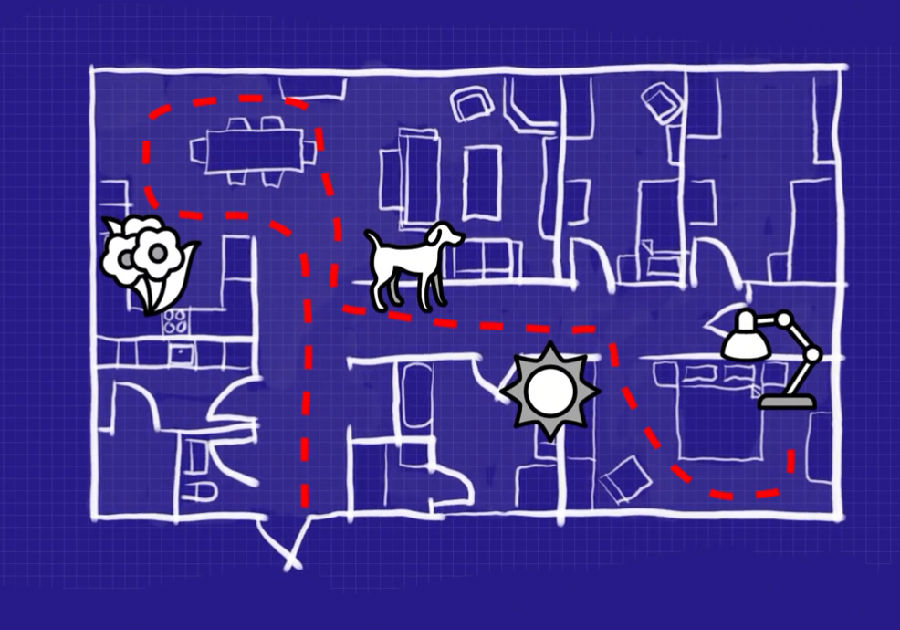I have a terrible memory.
我记忆力很差。
I can’t remember birthdays, I notoriously butcher movie lines, and I forget somebody’s name five seconds after I meet them.
我记不住生日,对电影台词的记忆更是出了名的差,而且刚认识一个人五秒钟我就把他们的名字给忘了。
But by the end of this video I’m going to be reciting an entire chapter from Moby Dick by heart,
但是,在本片最后我将尝试背诵《白鲸记》一整章的内容,
because, as it turns out, there’s a way for anybody to hack their memory.
因为,事实表明,每个人都有能力破解自己的记忆力。
The way that we normally try to memorize stuff is inefficient and pretty bad.
我们通常使用的记忆方式不仅缺乏效率,效果也很糟糕。
Flash cards, rote repetition, anxiously putting your hand on your forehead just don’t work.
记忆卡、死记硬背、努力用手托着两鬓,这些办法都没用。
That’s because as much as we’d like to, our brains don’t respond well to brute force.
那是因为事与愿违,我们的大脑就是不会屈于强力。
What we are good at is remembering things when we have a context, be it visual, emotional, or spatial.
我们擅长的是情境记忆,无论是视觉、情感还是空间的情境。
We’re good at remembering faces, we instinctively remember what song was playing during our first kiss,
我们擅长记容貌,能够立刻回想起初吻时听到的歌曲,
and we can effortlessly walk a few blocks to the store and get back to our house without even having to think about it.
甚至想都不用想就能穿过几个街区去商店买东西然后回家。
Why is that?
为什么会这样呢?
Well, it turns out that the same part of our brain that’s thought to be involved in emotion and spatial navigation,
原来,大脑里被认为和情绪、空间导航有关的部分,
the hippocampus, also happens to control short- and long-term memory processing.
也就是海马体,恰巧也是控制短时记忆和长时记忆的地方。
Now, I know what you’re thinking: If only there were a way to combine the two.
我知道你们在想什么,你们肯定在想,要是有办法把这两者结合起来该多好啊!
Enter the memory palace.
欢迎来到记忆宫殿。
A memory palace is a memorization technique that makes it easier to remember things by giving it a visual and spatial hook.
记忆宫殿是一种通过借助视觉或空间引子训练记忆力的记忆术。
It combines something that humans are innately pretty bad at with something that we’ve been doing for ages.
也即将我们生来就不擅长的东西和我们早已习以为常的东西相结合。
Basically, you assign images to the content you want to memorize, then place them on a path in a real-life location.
大体来说就是赋予你要记忆的内容以图像,然后把这些图像放入现实生活中某个地方的一条通道上。
Then when you retrace the path in your mind, you see the images, are able to recall the content, and all of the sudden you look like a memory genius.
当你在脑海中再次进入这些通道,你就能看到图像然后回忆起相关的内容,就像突然变成了记忆天才一样。
So does this actually work?
那这个办法真的管用吗?
Step 1: choose a location that you know really well to serve as your memory palace.
第一步:选择一个你了如指掌的地方作记忆宫殿。
It seems pretty generous to deem it a palace, but for this example I chose to use my apartment.
记忆宫殿听起来好像很豪华的样子,但对于今天这个例子,我其实就选了我的公寓。
I went around and mentally mapped out the space, making sure I had a clear image of the layout,
我会在公寓里来回走动,然后把物品纷纷对上号,确保对公寓的构造有一个清晰的印象。
where the furniture was, and whether or not I needed to change my cat’s litter box, which, it turns out, I did.
家具在哪里,要不要换掉猫砂盆,最后我的确换掉了。
Step 2: choose what you want to memorize.
第二步:选择你要记忆的内容。
You can choose anything that you want: a poem, the state capitals, the first 25 digits of pi. Whatever.
你可以选择任何你想记住的东西:一首诗、国家的首都、圆周率π的前25位数值,随便什么都行。
I chose a chapter from one of my favorite books, Moby Dick.
我选的是我最喜欢的《白鲸记》里的一个章节。
Granted, it’s one of the shorter chapters, but it’s really good, and you’ve got to start somewhere,
诚然,我选的章节算是比较短的,不过这章真的很精彩,而且好赖也算开了个头嘛,
so how about everyone just play it cool, all right?
你们就将就听,好吧?

I’ve read this chapter a number of times, but I don’t remember more than a few words off the top of my head.
这一章我已经看过好几遍了,但我还是只记住了几句话。
So I know that the first line is, “I leave a white wake.”
我记得第一句,“我驶到哪里,那里就留下一条又白又深的船迹”
There’s a line where he talks about a heavy crown and his destiny is on rails at some point.
有个地方还有一句是叙述者讨论他那沉重的王冠以及他的命运。
Step 3: create a really compelling visual image for each line or item.
第三步:给每一句或每个东西赋予非常有感染力的视觉图像。
What I did was take the chapter and break it up into individual sentences, 38 in all, each one getting their own image.
我所做的就是把这个章节拆成一个一个的句子,一共是38句,每一句都有自己的图像。
So for the first line — “I leave a white and turbid wake; pale waters, paler cheeks, where’er I sail” —
所以,第一句——我驶到哪里,那里就留下一条又白又深的船迹;灰蒙蒙的海洋,白茫茫的风帆。——
I create in my mind an image of John Waters, pale and dressed in white, crying uncontrollably at somebody’s wake.
我在脑海里创造了一个约翰·沃特斯,脸色苍白,一身白衣,在为某人守灵时哭得泣不成声。
Pretty memorable image, right? You want to make all of your images as distinctive and interesting as possible.
很好记的图像对吧?我们要尽可能创造独特而有趣的图像。
The weirder and more emotional that they are, the easier it will be for you to remember.
创造的图像越怪越感性,记起来就越容易。
Feel free to make them vulgar or outrageous.
下流、无耻的图像也可以。
Nobody needs to know what’s inside your memory palace.
毕竟,别人没必要知道你的记忆宫殿里有什么。
Step 4: place your images along a path through your memory palace.
第四步:把你的图像沿着记忆宫殿里的一条路放置好。
I took the John Waters image and placed it on the first stop of my path: the landing on the stoop of my apartment.
我把约翰·沃特斯的图像放在了我记忆路线的第一站:我公寓门廊的转角处。
I did this for the rest of the chapter, line by line, until each line had a unique, weird image.
按照这个方法逐句处理了剩下的内容,直到每一句都对应一个独特又怪异的图像。
Step 5: memorize.
第五步:记忆。
The thing about memory palaces is that they’re not going to help you memorize anything instantly.
问题是,记忆宫殿并不会让我们立刻就能把东西记下来。
You still have to go through and do the work. And it is work.
我们还是需要一步一步地完成记忆工作,
But studies have shown that students who use memory palaces or other mnemonic techniques to study consistently and significantly outperform students that don’t.
然而,研究表明,学习时使用记忆宫殿或其他记忆术的同学总是比其他同学表现得要好,而且是好得多。
It’s also proven to be a powerful learning tool for students with disabilities.
研究还表明,这一方法对残疾学生也非常管用。
So does this actually work? I got up in front of all my co-workers to find out.
真的有这么神奇?为了弄清楚这一问题,我站到了我所有同事的面前。
I leave a white and turbid wake. Pale waters, paler cheeks, wherever I sail.
我驶到哪里,那里就留下一条又白又深的船迹;灰蒙蒙的海洋,白茫茫的风帆。
The envious billow sidelong swell to whelm my track, let them, but first I pass.
妒忌的波涛打两边涌起,想淹没我的航道;随它们去吧,不过,我要先驶过去。
Yonder, by ever-brimming goblet’s rim, the warm waves blush like wine.
在那边,在那只始终是泼泼满的大杯边,急浪红似酒。
The gold brow plums the blue.
金黄色的夕阳压着苍海。
The diver sun — slow dived from noon — goes down, my soul mounts up.
那个潜水鸟似的太阳...打从午刻就缓慢地下潜...在下去了;我的灵魂却在往上攀!
Spending three or four hours everyday practicing, it only took me about four days to memorize the whole thing.
我每天花了三到四个小时练习,最后我只花了四天就记住了这一章所有的内容。
The path to my fixed purpose is laid with iron rails, whereon my soul is grooved to run.
通往目的地的道路已铺满铁轨,我将要紧它奋勇向前。
Over unsounded gorges, through the rifled hearts of mountains, under torrent’s beds, unerringly I rush.
越过杳无人烟的峡谷,穿过深山丛壑,钻过急流的河床,我就这样正确地冲出去!
Naught’s an obstacle, naught’s an angle, to the iron way.
这条铁路毫无阻碍,毫不弯曲。
So now that I know some of the secrets to memorization,
既然现在我已经掌握了记忆的秘诀,
does that mean that I’m going to enter next year’s US Memory Championship?
这是否就意味着我能挑战明年的“全美记忆锦标赛”呢?
Um, we’ll see.
这个嘛,我们拭目以待喽。












